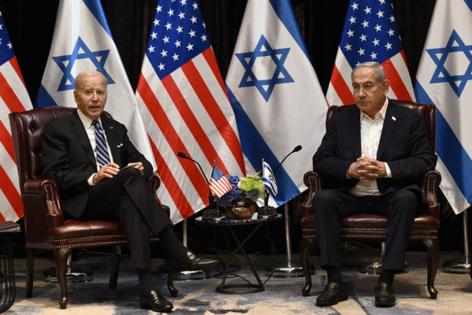US spy chief becomes key envoy as Biden-Netanyahu ties fray
Published in News & Features
One key American official is quietly keeping Washington’s lines of communication open across the Middle East as the U.S. and Israel endure their worst falling-out in decades over the war in Gaza.
Central Intelligence Agency Director William Burns, a veteran diplomat and Arabic speaker, was in Cairo alongside Qatari and Egyptian mediators this week as U.S. President Joe Biden set off a political firestorm by halting the shipment of about 3,500 bombs to Israel. The White House is increasingly concerned about massive civilian casualties if Israel launches a ground offensive on Rafah, the southern Gaza city where 1.4 million Palestinians are sheltering from the war.
Biden’s priority is winning a deal to release more of the hostages Hamas took in its deadly Oct. 7 attack on Israel. And it’s fallen to the U.S. intelligence chief to balance Biden’s carrots-and-sticks approach as Washington struggles to keep the seven-month-old war from escalating further.
Burns is “a man of results and I think one of the best U.S. diplomats I have ever met,” said Amr Moussa, a former Egyptian foreign minister.
His involvement, according to Moussa, is a recognition by the U.S. that “the rage” in the Middle East provoked by the Gaza war and Washington’s support for Israel has put the U.S.’s reputation and credibility on the line, particularly with traditional Arab allies such as Egypt, Jordan and Saudi Arabia. They believe the White House should have put more pressure on Israeli Prime Minister Benjamin Netanyahu to end the conflict.
Burns “has assiduously developed personal relationships with leaders across the region for decades,” said William Usher, a former senior Middle East analyst at the CIA. “We are at a critical stage. All sides have incentives to back out of a deal and in moments like this, public posturing can often backfire.”
Burns played an integral role in helping craft the week-long cease-fire late last year that led to the release of dozens of prisoners on both sides. For a moment earlier this week, it almost seemed as if Burns and his counterparts had pulled it off again after Hamas, designated a terrorist group by the U.S. and European Union, said it had accepted a Qatari and Egyptian proposal to halt hostilities.
But the talks quickly stalled again as it became clear Israel would not accept Hamas’s proposal for a truce effectively to be permanent.
While Burns appears to be the most prominent U.S. official on the Middle East file at the moment, given the importance of the ceasefire-for-hostages deal that might end the violence, he’s hardly the only official in what has at times seemed like a full-court press from the Biden administration.
National Security Adviser Jake Sullivan, White House Middle East envoy Brett McGurk, Defense Secretary Lloyd Austin, and the presidential coordinator on global infrastructure Amos Hochstein — who has experience negotiating with Lebanon, where Iran-backed Hezbollah militants are based — have all made extended trips to and within the region.
...continued
©2024 Bloomberg L.P. Visit bloomberg.com. Distributed by Tribune Content Agency, LLC.







Comments